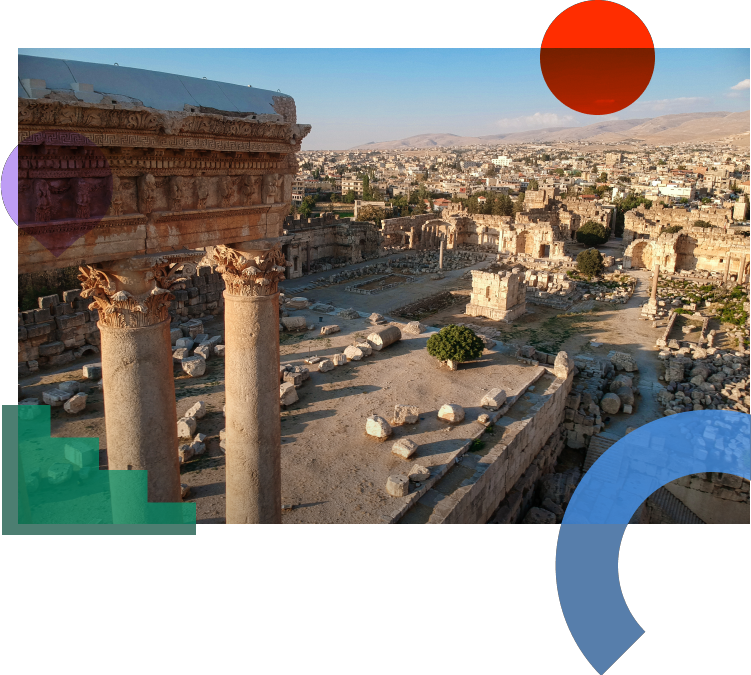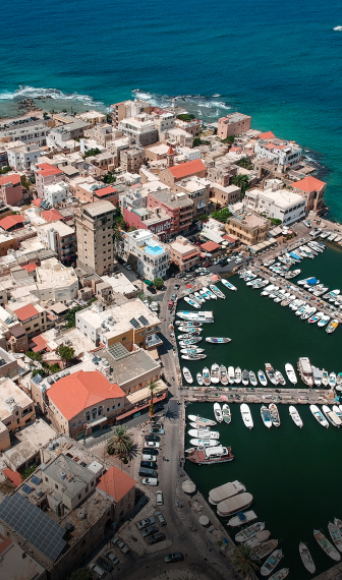23–24 March 2022
NUF1
UN House, Beirut, Lebanon
Towards a more sustainable and inclusive future for Lebanese cities
About Lebanon NUF1
The first National Urban Forum (NUF1) of Lebanon is being held from 23 to 24 March 2022, under the patronage of the President of the Council of Ministers of the Lebanese Republic, H.E. Mr. Najib Mikati.
NUF1 is co-organized by UN-Habitat and ESCWA.
The overall objective of this first NUF of Lebanon is to concretely discuss the increasing urban challenges, considering the multiple ongoing crises in Lebanon and articulate why an urban lens is indispensable to contributing to finding evidence-based solutions out of the current complexities, and to fostering a sustainable, inclusive and prosperous Lebanon.
During the NUF1 in Lebanon, four reports will be launched:
- UN-Habitat and ESCWA’s State of the Lebanese Cities Report
- UN-Habitat’s Guide on Mainstreaming Transport and Mobility in Lebanon’s National Urban Policy
- UN-Habitat’s Guide on Mainstreaming Housing in Lebanon’s National Urban Policy
- UN-Habitat’s Lebanon’s National Urban Policy Synthesis Report: Intersection of Housing and Transport
The two-day event will be livestreamed to the public and feature thematic sessions on housing, energy and transport, where different stakeholders will come together to discuss the state of these sectors in Lebanon and the priorities outlined in UN-Habitat’s housing and transport guides, and to outline possible immediate-term solutions to mitigate emerging needs until policy formulation advances.
For more background information on the NUF1, click here.

Programme
Day 1, Wednesday, 23 March 2022
Launch of the State of the Lebanese Cities Report
The first forum day is focused on positioning the event’s themes within the current urban political, policy and institutional landscape of the country. Following the opening of the forum, a plenary session will be held, where the current state of urbanization will be presented, launching the State of the Lebanese Cities Report prepared by UN-Habitat Lebanon in partnership with ESCWA.
9:30–10:00 a.m.
Session I: Opening remarks and launch of the UN-Habitat–ESCWA State of the Lebanese Cities Report
10:00–10:50 a.m.
Session II: The state of urbanization in Lebanon
This session provides an overview of urbanization in Lebanon through the launch of the State of the Lebanese Cities Report.
11:00–12:35 a.m.
Session III: The significance of urban data: Data generation and evidence-led decision-making for urban crisis response and longer-term development
09:00 a.m.–1:35 p.m.
NUF Urban Fair
Location: UN House ESCWA (Conference Hall), Beirut
Day 2, Thursday, 24 March 2022
Thematic sessions
Apart from the overarching theme “Towards a More Sustainable and Inclusive Future for Lebanese Cities,” NUF1 will specifically focus on three main themes, which have also been articulated as key focus areas for reform and focus in Lebanon by the recent ministerial statement issued on 16 September 2021 by the Government of Lebanon upon its formation, detailing its priorities for its term in office.
9:30 a.m.–10:00 a.m.
Session I: Opening remarks
10:00 a.m.–11:30 a.m.
Session II: Towards the development of a national urban transport and mobility policy
Launch of UN-Habitat’s Guide on Mainstreaming Transport and Mobility in Lebanon’s National Urban Policy and discussion on way forward
12:00 a.m.–1:30 p.m.
Session III: Towards the development of an inclusive national housing policy
Launch of UN-Habitat’s Guide on Mainstreaming Housing in Lebanon’s National Urban Policy and discussion on way forward
2:30 p.m.–3:45 p.m.
Session IV: Towards sustainable energy solutions for an urbanizing Lebanon
3:45–4:00 p.m.
Plenary recap: Adoption of NUF1 Declared Actions
09:00 a.m.–3:00 p.m.
NUF Urban Fair
Location: UN House ESCWA (Conference Hall), Beirut
Documents
NUF Urban Fair
The fair is organized to provide an opportunity for selected partners to display the best examples of as well as future interventions in urban practices, mainly related to housing, transport, and renewable energy. The fair aims to promote these practices and solutions to exchange experiences, share knowledge, and demonstrate opportunities. Exhibitors will present publications and display visuals about their work.
Beirut Heritage Initiative
Lebanon
Beirut Urban Lab (American University of Beirut)
Lebanon
Lebanese Centre for Energy Conservation
Lebanon
Lebanon Green Building Council
Lebanon
Public Works Studio
Lebanon
Riders’ Rights
Lebanon
Train/Train
Lebanon
United Cities
Lebanon
Lebanon
Lebanon is one of the most urbanized countries in both the Arab region and the world, with around 89 percent of its population living in urban areas.
For decades, the country has witnessed rapid and uncontrolled urban growth and sprawl. With limited planning regulations in place or enforced, built-up areas are expanding to cover increasingly large spaces, while at the same time, urban disparities have and continue to grow.
The lack of local planning and cross-sectoral master plans hinders any absorption capacity of the increasing urban population and its social, economic, environmental and demographic needs.
The multiple crises the country has been facing in the past years – including the protracted Syrian refugee crisis, the worsening and dire socioeconomic situation, the ongoing and crippling energy crisis, the COVID-19 pandemic, the political instability, and financial collapse – have placed huge additional pressure on already poorly served urban areas, resulting in increased poverty, widening inequalities, and heightened social tensions.
With the ongoing crises, persons with vulnerabilities are increasingly marginalized and at risk in the urban context. The public social infrastructure is weak, social protection is fragmented, and social services have declined with the ongoing crises, raising concerns, particularly in urban areas.
The compounded crises have also vastly affected the already weak provision of adequate and affordable housing as well as basic urban services and infrastructure, including electricity and transport, among others.
These in turn contribute to increased instances of discrimination, exclusion and violence, as well as feelings of insecurity and unsafety, especially among the most vulnerable segments of the population.


